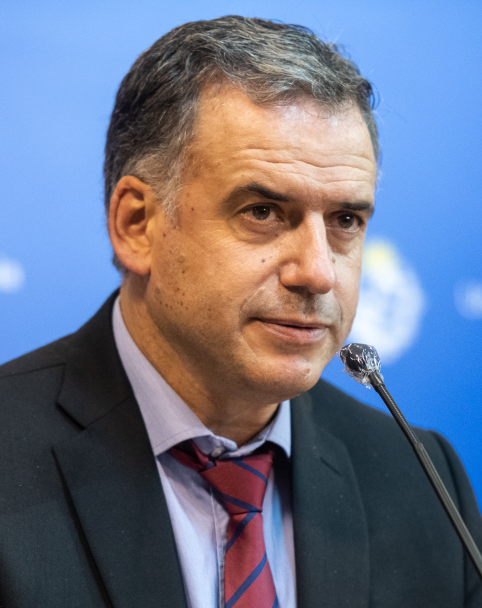MONTEVIDEO, (Reuters) – Center-left opposition candidate Yamandu Orsi secured victory in Uruguay’s presidential election, official results showed yesterday, with 99% of votes tallied, in a second-round race that pollsters expected to be closely fought.
Yamandu Orsi, the pre-election favorite by a few points, secured a small but comfortable margin of 49.81% of the vote to conservative Alvaro Delgado’s 45.90%, official results showed.
“The horizon is brightening,” Orsi said as he addressed thousands of his Broad Front party supporters in Montevideo, who had gathered by a stage overlooking the capital city’s waterfront to await the results.
“I am going to be the president who calls for national dialogue again and again,” he said. “The country of freedom, equality and also fraternity triumphs once again … Let’s continue on that path.”
Orsi, a 57-year-old former mayor of Canelones – which has lured in firms such as a Google – has said he would avoid raising taxes that could scare off business and instead focus on attracting investors, spurring growth and skilling workers.
He has also signaled closer cooperation with Europe on fighting drug trafficking and more funding for the prison system.
His victory was celebrated by the regional Organization of American States and fellow Latin American nations across the political aisle.
Both Delgado and Uruguay’s president, fellow National Party member Luis Lacalle Pou, conceded the election, swiftly congratulating Orsi and offering to help with the transition after results signaled a victory for the center-left.
The election between two moderates in the small nation of 3.4 million people, known for its beaches, legalized marijuana and stability, marks the closing of a bumper year for global elections – many that suffered from bitter political divides.
Orsi, Delgado and Lacalle Pou all expressed goodwill for their political opposition and pledged to work together to move the country forward.
Unlike sharp right-left divides in recent elections in Argentina, Brazil and Mexico, Uruguay’s political arena is relatively tension-free, with significant overlap between the conservative and liberal coalitions vying for office.
High living costs, inequality and violent crime are among Uruguayans’ biggest worries, but inflation had been easing in the run-up to the election, and both employment and real salaries are on the rise.
Orsi, who has pledged a “modern left” policy approach, won 43.9% of the first-round October vote for the Broad Front and faced Delgado, who secured 26.8% but also had the backing of the conservative Colorado Party that together with his National Party made up almost 42% of votes.
Orsi had sought to reassure Uruguayans that he does not plan a sharp policy shift in the traditionally moderate and relatively wealthy nation.
Agustin Rubbo, 27, said he felt relieved. “I hope for a country that is fairer, more to the left,” he said.
Construction worker Ruben Parada, 44, a resident of Montevideo, said he was voting for Orsi because his Broad Front party “thought less about the rich” and would do more to help working people.
Conservative Delgado had asked voters to “reelect a good government,” seeking to capitalize on the popularity of Lacalle Pou.
ECONOMIC SUCCESSES
While the ruling coalition is struggling to defend its record on fighting crime and over several corruption scandals, it had hoped economic successes might be enough to convince voters to choose continuity over change.
“They did more in five years than the Broad Front did in 15 years,” said 38-year-old Jaqueline Fleitas, who cast her second-round ballot for Delgado, mentioning the construction of a hospital near her home in Montevideo.
Neither coalition has an absolute majority in the lower house following October’s elections. But Orsi’s Broad Front won 16 of 30 Senate seats. He says his Senate majority puts him in a better position to lead the next government.
Sunday’s results confirmed that Uruguay had followed a global trend of incumbent parties losing vote share compared with the previous election, as the biggest year for elections in history comes to an end. Voters hurt by inflation have punished parties in power, including in Britain, Japan and the United States.









